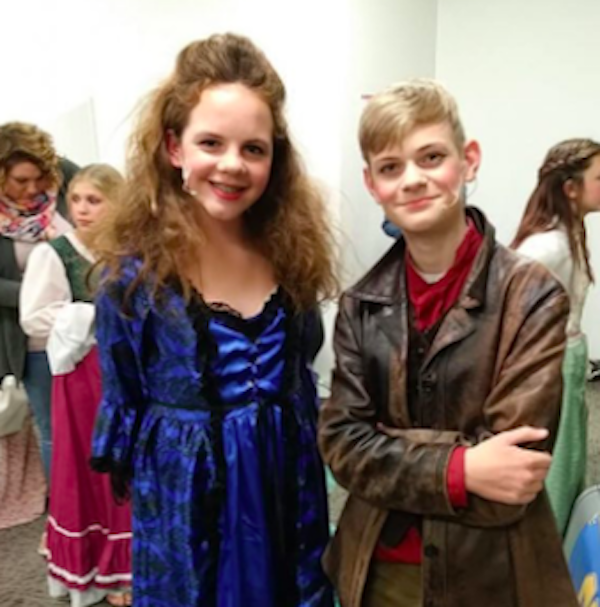It was never her intention to break my heart.
I blame Facebook—soulless, intentionless Facebook—for carelessly coughing up a memory “from one year ago today!” that my friend then decided to share with me. I’m sure she imagined it would bring a smile to my face.
In this picture, our children have dutifully struck a pose; not even embarrassing mom-thusiasm can dampen their own opening night excitement. Classmates and companions since preschool, the two young teens smile with confidence through heavy stage makeup and skin-pulling mic tape. A couple of hours later, my son would take a triumphant bow while I thought to myself: “Would you look at that kid shine!”
But one year later, the sight of those proud, eager faces—faces blissfully ignorant of the ways in which their world would soon be turned upside down—caused something inside me to break wide open. An ache I hadn’t allowed myself to recognize grew too large to be ignored.
This pandemic has taken so much from so many. Lives and livelihoods have been lost; Black communities gutted, timelines fractured, futures made uncertain. I understand that what my (white, privileged) children have lost by being out of school is but a small, private hardship against the backdrop of worldwide devastation.
And yet.
And yet, the loss feels very real. And yet, I grieve the fact that a year of my kids’ childhood has been forfeited to this virus.
Fun fact: young people need adults in their lives who aren’t their parents. Teachers, coaches, bus drivers, mentors, youth group leaders, friends’ parents (like the one who sent me this picture)—it takes a village, right?
Kids need adults who are free from the baggage and emotional attachments of parenthood, see the world of possibilities within, and can delight in our children, encourage them, and lovingly (or even not so lovingly) offer correction.
Overnight, my two teenage boys (along with millions of students across the country) lost these adults. Gone were the impromptu hallway conversations about so-and-so’s older sibling or the latest Netflix series. Without warning, there were no more after school rehearsals or sports practices, no more cheers from the sidelines or pep talks after a tough loss. No more birthdays or student achievements announced over the intercom and then reinforced throughout the day by teachers and administrators exclaiming “Happy Birthday!” or “Great job!” No more rowdy, outdoor STEM experiments, spirit days, book fairs, talent shows, or field trips.
And not for nothin’, but parents lost these adults, too. We lost others who believe in our kids, who love them, who spend time and energy on them, who provide both constructive feedback and much-needed reassurance. We lost parent-teacher conferences and precious Mother’s Day projects, lost the opportunity (though I admit to sometimes viewing this as drudgery) to haul camp chairs and blankets and tall coffees to the sidelines of chilly, early spring sporting events. We lost the camaraderie of other parents who agreed with us 100 percent that the star player on the other team was perhaps a little too aggressive, or who witnessed our child do something amazing while we were still unfolding our chair.
Kids lost structure. Bedtimes, bells, dress codes, schedules, obligations, expectations—so many of these things went by the wayside in the wake of a head-spinning pivot on the part of schools, coupled with working parents (including teachers) juggling new home offices and the education of their children.
Kids lost their peers. An inch-high face on Zoom is not the same as a giggle shared on the way to class, or a seat saved at lunch, or a hand outstretched following a playground tumble. A deprivation at any age, for my teenagers the abrupt disappearance of their peer group meant they had no one to laugh at their immature jokes, no one serving as an example, no one to look to for the kind of reassurance only a peer can give.
As the months wore on, of course, the losses continued to accrue. It felt like a head-on collision taking place in slow-motion. Death by a thousand paper cuts.
Stay-at-home orders were meted out a couple of weeks at a time. The school play—rehearsals which had continued via Zoom, bless that teacher’s heart—was eventually canceled. So was the overnight trip to Cape Henlopen, and my son’s 8th-grade graduation (a big deal in my son’s charter school, where most of the kids had attended school together since kindergarten). Closer to summer, my sons were also forced to relinquish summer camps and family vacations, the thrill of being home alone while parents were away at work, and the freedom to explore their new neighborhood.
The boy smiling back at me from that Facebook memory no longer exists. He’s become a little smaller, somehow. Less confident. Less outgoing. More insular. He smiles less. A 9th grader now, he doesn’t seem very connected to any of the adults at his new school. I wonder, sometimes, if he’s afraid to attach, afraid it could all be ripped out from under him again.
He’ll be okay, but what’s been lost cannot be recovered.
This is true for all of our children, regardless of age or stage. And while it’s not death or job loss or a devastated economy, it’s still important to acknowledge and grieve the irrevocable.
I have always been a parent who appreciated my kids’ teachers. I’ve hand-written thank you notes and sent gift cards at the holidays; I’ve contributed classroom supplies and sang their praises on Facebook. But I don’t believe I fully comprehended the depth and breadth of their impact on my children’s well-being until it was gone. If you feel similarly—if you miss school as much as your kids do—take a moment to reach out and let those teachers know how much you value their presence in your children’s lives. Whether they’re teaching in person or virtually, I imagine they could all use a lift these days.
In fact, post it on Facebook. That will be a memory worth sharing a year from now.












Read 4 comments and reply